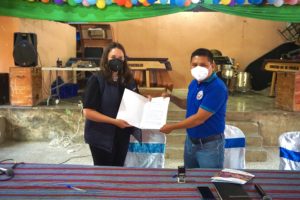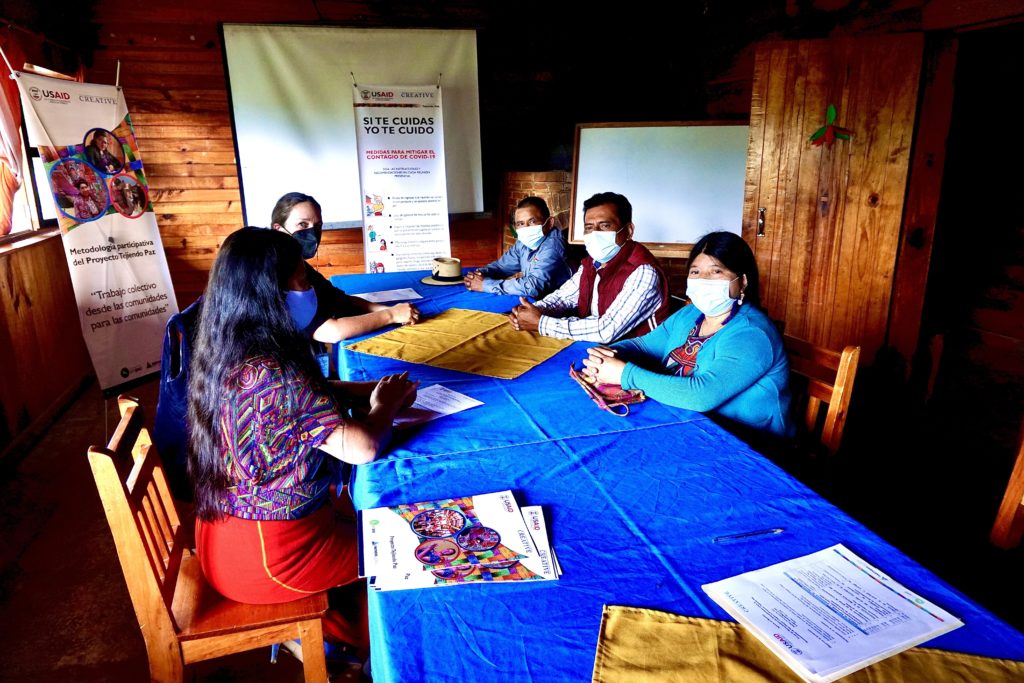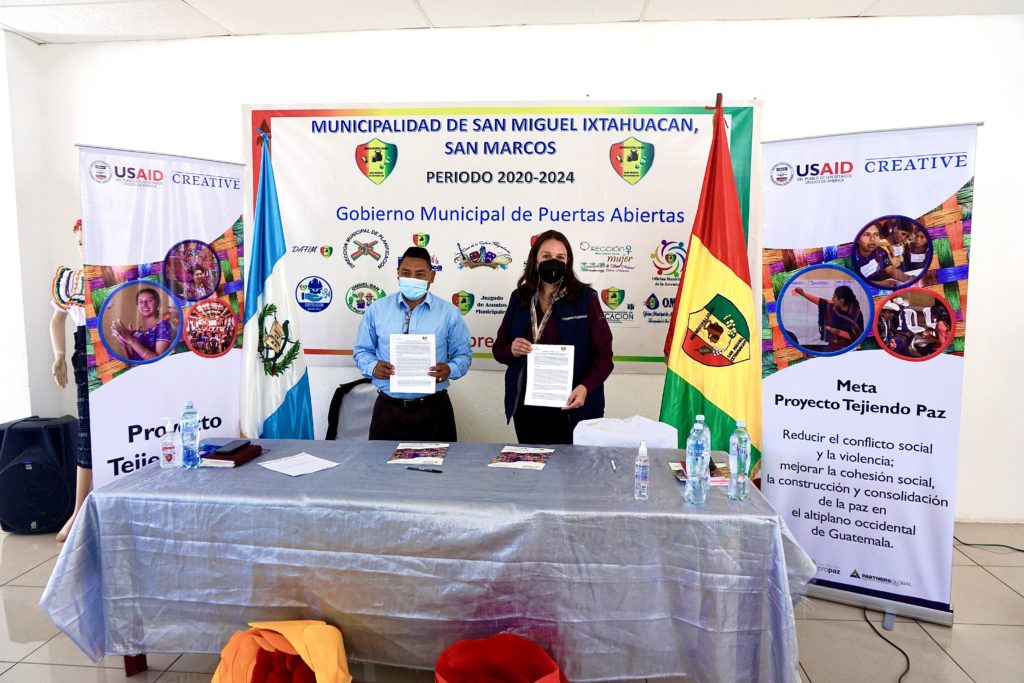USAID Peacebuilding Project expands coverage in the Western Highlands
Six new Guatemalan municipalities sign Peacebuilding agreement
By Aja Beckham
In late August, authorities from six Guatemalan municipalities signed agreements that seek to resolve conflict and restore peace in Guatemala’s Western Highlands. These new Memoranda of Understanding build on the agreements signed with four departmental governments and four municipal governments in 2019 and 2020.
The memoranda were signed by Creative through the Peacebuilding Project (Proyecto Tejiendo Paz in Spanish). The six-year project works on conflict mitigation and peacebuilding in the Western Highlands. It is funded by the U.S. Agency for International Development and implemented by Creative Associates International with partners Fundación ProPaz and PartnersGlobal.
The agreement is an initial step in addressing social conflict, and municipality officials will now begin to co-create an action plan to resolve conflicts called Municipal Peace Plans.
Sara Barker, the Peacebuilding Project’s Chief of Party, says these new municipalities signed on because the agreement creates opportunity for community development.
“The Peacebuilding Project works with local leaders to transform conflicts into opportunities for development,” says Barker. “Municipal authorities expressed their commitment to supporting communities in identifying locally-led solutions to conflict. They believe that these efforts will increase social cohesion and strengthen roots in the communities.”
The Western Highlands has one of the highest rates of migration in the country, as people flee their communities in search of safer environments.
The project will also implement activities aimed at reducing violence and conflict in the context of the COVID-19 pandemic.
Entry into new municipalities was on hold for much of the past year due to the pandemic and limitations in funding. The project recently received funding from the Complex Crises Fund in response to the urgent need to mitigate conflict and violence during the COVID crisis.
COVID-19 and social conflict

The COVID-19 crisis is devastating for vulnerable communities in Guatemala that already experience social conflict, have limited access to services and experience high levels of poverty.
The Peacebuilding Project addresses the underlying causes of social conflict by focusing on four categories of conflict: youth, gender and families; governance; land; and natural resources.
Luz Lainfiesta, Deputy Chief of Party of the Peacebuilding Project, says the ongoing COVID crisis is worsening existing conflicts and contributing to new ones, particularly related to governance and youth, gender and families.
“The COVID-19 pandemic has deepened the structural conditions and the foundation for the emergence of conflict. It’s added pressure on families and systems and caused negative impacts, triggered new conflicts and exacerbate existing ones.”
With the Complex Crises Funds, the project has expanded into communities located in the six new municipalities to develop action plans, known as community visions, that respond to conflicts resulting from the pandemic. Municipal authorities, who are on the front line in responding to community needs, play a critical role in mitigating conflict in the context of continued COVID-19 restrictions and responses.
“Domestic violence conflicts, unemployment and poverty have increased during the pandemic,” says Maria Elvira Batz, Councilor 5 of the municipality Totonicapán.
Domestic and gender-based violence have been identified by communities as a priority issue because it contributes to the disintegration of social cohesion and limits effective civic participation of women.
The project will implement a communication strategy to prevent and reduce domestic violence and provide grants for gender-based violence prevention services, which the municipalities agreed to support through these MOUs.

Locally-led solutions that contribute to lasting peace
Fernando Miranda, a supervisor of Peacebuilding Project community facilitators, says another reason that local officials signed on to the project is because community facilitators are from the Western Highlands, speak the local Mayan languages and work collaboratively with officials to improve cohesion and peace.
“The idea is to count on community facilitators to lay the foundations for building strategic relationships with local authorities that can support the achievement of the project’s results and its long-term sustainability,” says Miranda. “The support of local authorities is key to ensuring a smooth and successful implementation of the community visions.”
The facilitators also build relationships with community leaders to strengthen their engagement. The community facilitators also establish women and youth activist groups at the community level and meet with the groups to understand the type of conflict — land and natural resources, gender, domestic-based violence — identify causes, and create a community-led action plan.
Approximately eight or nine communities develop community visions in each municipality. The community visions are then consolidated into Municipal Peace Plans. Municipal authorities and government agencies then work with community members to implement their peacebuilding priorities. These efforts rebuild trust and relationships between citizens and government agencies.

Timothy Feliciano Velasquez Bamaca, Municipal Mayor of San Miguel Ixtahuacan, San Marcos, says that he looks forward to building a team to collectively resolve concerns and foster peace in the area.
“There are conflicts everywhere. Resolving them is complex,” says Velasquez. “Through the signing of the MOU with the Peacebuilding Project and the municipality, a team will be created to address and solve them, and we’ll seek tranquility and peace together.”
In late August, these six new municipalities signed on: San Juan Cotzal, San Gaspar Chajul, San Andrés Sajcabajá and Santo Tomás Chichicastenango in the department of Quiché, San Miguel Ixtahuacán in the department of San Marcos and Huehuetenango in the department of Huehuetenango. The project re-signed MOUs with the following four municipalities in September: Chiantla and San Pedro Necta, Huehuetenango; Comitancillo, San Marcos; and Totonicapán, Totonicapán.
The Peacebuilding Project will continue to expand its geographic coverage. While the project currently works on conflict mitigation and peacebuilding in 10 municipalities, it plans to enter five more in early 2022. The project goal is to work in 130 communities in the 15 municipalities by the end of 2022.
Vivian Jacobs and Olga Lorenzana Alvarez contributed to this article.

